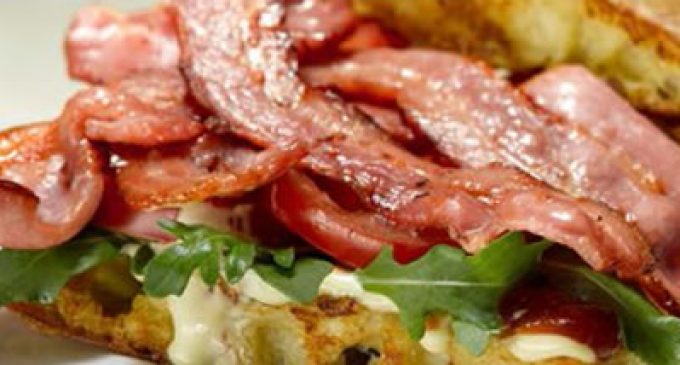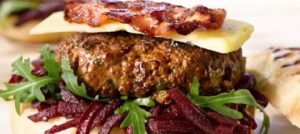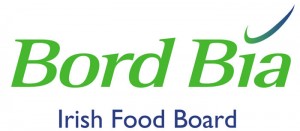Ireland’s ‘Eating Out of Home’ Market Reaches Record €7.5 Billion

Ireland’s foodservice market grew to a record €7.5 billion this year, and is forecast to grow to over €9 billion by 2020, according to a new Bord Bia report. The figures were welcomed by over 300 delegates at Bord Bia’s recent annual foodservice industry seminar in Dublin.
Foodservice or ‘out of home’ describes all food consumed away from home, including everything from restaurants, hotels, coffee shops and bars to workplace catering, hospitals, education and vending. According to Bord Bia, this market segment has benefited from better than anticipated economic growth, buoyant consumer confidence, a strong domestic and international tourist market, an unemployment rate that is now less than 8%, and the continuation of 9% VAT for hospitality.
 Bord Bia’s foodservice specialist, Maureen Gahan says: “It has been a bumper year for foodservice in Ireland. Despite the uncertainty that Brexit brings, we are still in the enviable position of being the fastest growing economy within the EU. The foodservice market has witnessed an annual growth rate of over 5% per year for over the past number of years, with both consumer and business tourist numbers fuelling major growth in urban centres.”
Bord Bia’s foodservice specialist, Maureen Gahan says: “It has been a bumper year for foodservice in Ireland. Despite the uncertainty that Brexit brings, we are still in the enviable position of being the fastest growing economy within the EU. The foodservice market has witnessed an annual growth rate of over 5% per year for over the past number of years, with both consumer and business tourist numbers fuelling major growth in urban centres.”
Foodservice Market in Ireland
Almost 35% of consumer spend is found in Quick Service Restaurants, which comprises traditional fast, and more upmarket, food outlets, along with the growing area of food-to-go. Pubs account for 18% of consumer spend (excluding alcohol), with food-led pubs seeing the biggest return. Strongest growth is occurring in the coffee shop segment, although from a small base. Other segments are showing significant improvement, notably leisure and travel, which are positively impacted by growing tourism business and spending on leisure activities.
Some trends highlighted in the in-depth report into the ‘out of home’ food and drink market found that:
- Despite the fact that foodservice can be associated with a space that consumers crave indulgence, health and authenticy continue to experience growing consumer demand. Increasingly operators are focused on broadly defined ‘healthy’ offerings. This may not necessarily mean lower fat or lower calories, but rather more on the types of ingredients, the transparency of the menu and how much of a menu item can be described as ‘natural’. Quick Service restaurants have been a target for criticism regarding the national focus on obesity and health concerns. The potential mandatory inclusion of calorie counts on menus as well as a tax on sugar sweetened drinks coming into effect in 2018 will put pressure on these outlets to consider healthier menu items that are cohesive with their offering.
 Operators speak about value, but not necessarily in terms of price only. Many feel that consumers are willing to spend money on higher quality food and beverage items and refer to ‘fair’ prices as opposed to the lowest price. Value creation tends to focus on maximizing the customer experience.
Operators speak about value, but not necessarily in terms of price only. Many feel that consumers are willing to spend money on higher quality food and beverage items and refer to ‘fair’ prices as opposed to the lowest price. Value creation tends to focus on maximizing the customer experience.- Provenance is still very much on trend, with a need from consumers to know who they’re supporting. Food with a story is something that operators increasingly market to their customers and where the food or beverage comes from is increasingly viewed as a critical determinant as to the quality of the item.
- There has been a strong focus on hiring chefs and others with culinary experience in an effort to create a better offer for the consumer. This greater culinary expression trend is true across all foodservice channels – hotels, full service restaurants, quick service restaurants and workplace caterers are all focused on elevating the culinary role. Ethnic food operations continue to thrive, matching the consumer taste for non-domestic menu offerings.
 Seminar Maximises Business Opportunities
Seminar Maximises Business Opportunities
This year, for the first time, Bord Bia introduced a ‘Producer Showcase’ to the seminar whereby almost 100 foodservice trade buyers had the opportunity to meet with 40 Irish food and drink producers in a ‘Farmers Market’-style environment. The showcase facilitated business development with existing and potential customers and is one of a series of activities arranged by Bord Bia to help Irish food and drink producers maintain and grow business on the domestic market.
 At the seminar chaired by entrepreneur and business man, Bobby Kerr, delegates heard from Amanda Roche Kelly, Managing Director of JUST EAT, Ireland’s leading online takeaway delivery service, who amplified consumers’ appetite for online technology, as well as a growing interest in a broader range of cuisine types including Ethnic and Asian. Other speakers included, Louise O’Donohue of the Penny Loaf, an Offaly based family bakery that has participated on Bord Bia’s foodservice business programmes. Louise shared her experiences of operating in Ireland and the UK, while Michelle Fennell from Musgrave MarketPlace provided an insight into the future of Cash and Carry. Finally delegates heard market data updates and trends from further speakers including Techonomic and MCA.
At the seminar chaired by entrepreneur and business man, Bobby Kerr, delegates heard from Amanda Roche Kelly, Managing Director of JUST EAT, Ireland’s leading online takeaway delivery service, who amplified consumers’ appetite for online technology, as well as a growing interest in a broader range of cuisine types including Ethnic and Asian. Other speakers included, Louise O’Donohue of the Penny Loaf, an Offaly based family bakery that has participated on Bord Bia’s foodservice business programmes. Louise shared her experiences of operating in Ireland and the UK, while Michelle Fennell from Musgrave MarketPlace provided an insight into the future of Cash and Carry. Finally delegates heard market data updates and trends from further speakers including Techonomic and MCA.
Bord Bia has also published its Irish Foodservice Market Directory, which includes detailed profiles of over 100 operators and wholesale distributors. It is aimed at providing companies with key background information on potential customers and advice on how to drive their foodservice business. The directory is a key part of Bord Bia’s Ireland Market Foodservice Programme which assists suppliers develop relationships with foodservice distributors and operators. Under this programme, Bord Bia works closely with an average of 20 companies each year, delivering new business on the domestic market worth some €2 million annually.

































